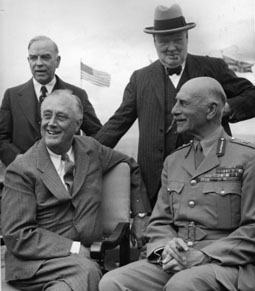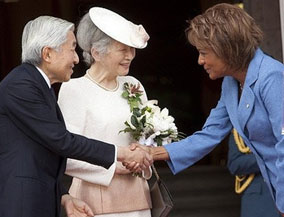How things have changed with Canada, UK, and USA today
Oct 16th, 2009 | By Randall White | Category: In Brief
Winston Churchill (right) and Canadian PM William Lyon Mackenzie King (left) stand behind US President Franklin Roosevelt and Canada's Governor General, the Earl of Athlone (at a time when Canadian governor generals were still British aristocrats, and not Canadian politicians or media personalities), at the Quebec Conference, August 18, 1943.
[UPDATED OCTOBER 22]. Charles and Camilla will arrive in Canada just two weeks this coming Monday.
Even if you don’t think the British monarchy has any long future in 21st century Canada (and I share this opinion myself with what recent opinion polls report as a growing majority of Canadians), the visit of the Prince of Wales and his current wife might remind you of an earlier era, when Canada was closer to the United Kingdom than it is now.
It isn’t just that Canada in the past generation or so has grown away from the UK, and closer to the geographically contiguous USA. The United Kingdom has grown closer to the United States itself. And this has weakened the ties between the UK and the Canada that used to be some vague anglophone cultural mediator – or “master link,” as Winston Churchill once hyperbolized – between the United Kingdom and the United States.
Thus a recent Angus Reid Strategies survey reports that a “large proportion of people in Britain appear dissatisfied with their country’s European Union (EU) membership.” In an “online survey of a representative sample of 2,005 British adults” 49 % “think EU membership has been bad for the UK,” and only 36% “think it has been good.”
This reminded me of a few recent sentences from the Oxford politics professor Ross McKibbin: “British politics is now dominated by two related phenomena – Atlanticism and Europhobia … The Labour Party is strongly Atlanticist and weakly Europhobic. It believes in the ideological and international superiority of the United States and its centrality to Britain’s relations with the world … The Conservatives are more extreme: they are very Atlanticist and very Europhobic.”
Yet there are still vestiges of the old “special relationship” between the United Kingdom and Canada, in another recent Angus Reid Strategies survey. This looks at support for the current multinational “military operation” in Afghanistan. It reports that as many as 54% of respondents in the United States still support the operation, but only 37% in Canada and 35% in the United Kingdom.

Governor General Michaelle Jean welcomes Japan’s Emperor Akihito and Empress Michiko to Canada, July 6, 2009.
Related European survey results from this past summer similarly suggest certain limits on UK Europhobia. The flip side of the Angus Reid survey is that 56% in Canada and 59% in the United Kingdom oppose the Afghanistan operation. This is also true of 64% in Canada’s other former mother country of France – along with 56% in Italy, 62% in Germany, 66% in Australia, and 74% in the Netherlands.
No one, apparently, is totally Americanized yet. And this doesn’t have anything to do with the British monarchy nowadays. So we Canadians don’t need to be too joyful about Charles and Camilla, when they arrive on Monday, November 2.
UPDATE OCTOBER 22: Bob Hepburn comments on related themes in today’s Toronto Star:Â “Why does Canada cling to British colonial roots?“

